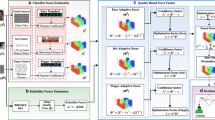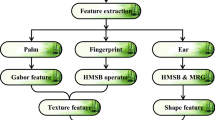Abstract
The issues of fusion with client-dependent and confidence information have been well studied separately in biometric authentication. In this study, we propose to take advantage of both sources of information in a discriminative framework. Initially, each source of information is processed on a per expert basis (plus on a per client basis for the first information and on a per example basis for the second information). Then, both sources of information are combined using a second-level classifier, across different experts. Although the formulation of such two-step solution is not new, the novelty lies in the way the sources of prior knowledge are incorporated prior to fusion using the second-level classifier. Because these two sources of information are of very different nature, one often needs to devise special algorithms to combine both information sources. Our framework that we call “Prior Knowledge Incorporation” has the advantage of using the standard machine learning algorithms. Based on 10 × 32=320 intramodal and multimodal fusion experiments carried out on the publicly available XM2VTS score-level fusion benchmark database, it is found that the generalisation performance of combining both information sources improves over using either or none of them, thus achieving a new state-of-the-art performance on this database.
Preview
Unable to display preview. Download preview PDF.
Similar content being viewed by others
References
Kittler, J., Matas, G., Jonsson, K., Sanchez, M.: Combining Evidence in Personal Identity Verification Systems. Pattern Recognition Letters 18(9), 845–852 (1997)
Saeta, J.R., Hernando, J.: On the Use of Score Pruning in Speaker Verification for Speaker Dependent Threshold Estimation. In: The Speaker and Language Recognition Workshop (Odyssey), Toledo, pp. 215–218 (2004)
Fiérrez-Aguilar, J., Ortega-Garcia, J., Gonzalez-Rodriguez, J.: Target dependent score normalization techniques and their application to signature verification. In: Zhang, D., Jain, A.K. (eds.) ICBA 2004. LNCS, vol. 3072, pp. 498–504. Springer, Heidelberg (2004)
Jain, A., Ross, A.: Learning User-Specific Parameters in Multibiometric System. In: Proc. Int’l Conf. of Image Processing (ICIP 2002), New York, pp. 57–70 (2002)
Kumar, A., Zhang, D.: Integrating Palmprint with Face for User Authentication. In: Workshop on Multimodal User Authentication (MMUA 2003), Santa Barbara, pp. 107–112 (2003)
Toh, K.-A., Yau, W.-Y., Lim, E., Chen, L., Ng, C.-H.: Fusion of Auxiliary Information for Multimodal Biometric Authentication. In: Zhang, D., Jain, A.K. (eds.) ICBA 2004. LNCS, vol. 3072, pp. 678–685. Springer, Heidelberg (2004)
Bigun, J., Fierrez-Aguilar, J., Ortega-Garcia, J., Gonzalez-Rodriguez, J.: Multimodal Biometric Authentication using Quality Signals in Mobile Communnications. In: 12th Int’l Conf. on Image Analysis and Processing, Mantova, pp. 2–11 (2003)
Fierrez-Aguilar, J., Ortega-Garcia, J., Gonzalez-Rodriguez, J., Bigun, J.: Kernel-Based Multimodal Biometric Verification Using Quality Signals. In: Defense and Security Symposium, Workshop on Biometric Technology for Human Identification, Proc. of SPIE, vol. 5404, pp. 544–554 (2004)
Garcia-Romero, D., Fierrez-Aguilar, J., Gonzalez-Rodriguez, J., Ortega-Garcia, J.: On the Use of Quality Measures for Text Independent Speaker Recognition. In: The Speaker and Language Recognition Workshop (Odyssey), Toledo, pp. 105–110 (2004)
Sanderson, C., Paliwal, K.K.: Information Fusion and Person Verification using Speech and Face Information. In: IDIAP-RR 22, IDIAP (2002)
Poh, N., Bengio, S.: Database, Protocol and Tools for Evaluating Score-Level Fusion Algorithms in Biometric Authentication. Research Report 04-44, IDIAP, Martigny, Switzerland (2004); Accepted for publication in AVBPA 2005
Poh, N., Bengio, S.: Improving Single Modal and Multimodal Biometric Authentication Using F-ratio Client Dependent Normalisation. Research Report 04-52, IDIAP, Martigny, Switzerland (2004)
Auckenthaler, R., Carey, M., Lloyd-Thomas, H.: Score Normalization for Text- Independant Speaker Verification Systems. Digital Signal Processing (DSP) Journal 10, 42–54 (2000)
Ben, M., Blouet, R., Bimbot, F.: A Monte-Carlo Method For Score Normalization in Automatic Speaker Verification Using Kullback-Leibler Distances. In: Proc. Int. Conf. Acoustics, Speech and Signal Processing (ICASSP), Orlando, vol. 1, pp. 689–692 (2002)
Bishop, C.: Neural Networks for Pattern Recognition. Oxford University Press, Oxford (1999)
Poh, N., Bengio, S.: Improving Fusion with Margin-Derived Confidence in Biometric Authentication Tasks. Research Report 04-63, IDIAP, Martigny, Switzerland (2004); Accepted for publication in AVBPA 2005
Bengio, S., Mariéthoz, J.: A Statistical Significance Test for Person Authentication. In: The Speaker and Language Recognition Workshop (Odyssey), Toledo, pp. 237–244 (2004)
Matas, J., Hamouz, M., Jonsson, K., Kittler, J., Li, Y., Kotropoulos, C., Tefas, A., Pitas, I., Tan, T., Yan, H., Smeraldi, F., Begun, J., Capdevielle, N., Gerstner, W., Ben-Yacoub, S., Abdeljaoued, Y., Mayoraz, E.: Comparison of Face Verification Results on the XM2VTS Database. In: Proc. 15th Int’l Conf. Pattern Recognition, Barcelona, vol. 4, pp. 858–863 (2000)
Martin, A., Doddington, G., Kamm, T., Ordowsk, M., Przybocki, M.: The DET Curve in Assessment of Detection Task Performance. In: Proc. Eurospeech 1997, Rhodes, pp. 1895–1898 (1997)
Bengio, S., Mariéthoz, J.: The Expected Performance Curve: a New Assessment Measure for Person Authentication. In: The Speaker and Language Recognition Workshop (Odyssey), Toledo, pp. 279–284 (2004)
Author information
Authors and Affiliations
Editor information
Editors and Affiliations
Rights and permissions
Copyright information
© 2005 Springer-Verlag Berlin Heidelberg
About this paper
Cite this paper
Poh, N., Bengio, S. (2005). A Novel Approach to Combining Client-Dependent and Confidence Information in Multimodal Biometrics. In: Kanade, T., Jain, A., Ratha, N.K. (eds) Audio- and Video-Based Biometric Person Authentication. AVBPA 2005. Lecture Notes in Computer Science, vol 3546. Springer, Berlin, Heidelberg. https://doi.org/10.1007/11527923_116
Download citation
DOI: https://doi.org/10.1007/11527923_116
Publisher Name: Springer, Berlin, Heidelberg
Print ISBN: 978-3-540-27887-0
Online ISBN: 978-3-540-31638-1
eBook Packages: Computer ScienceComputer Science (R0)




